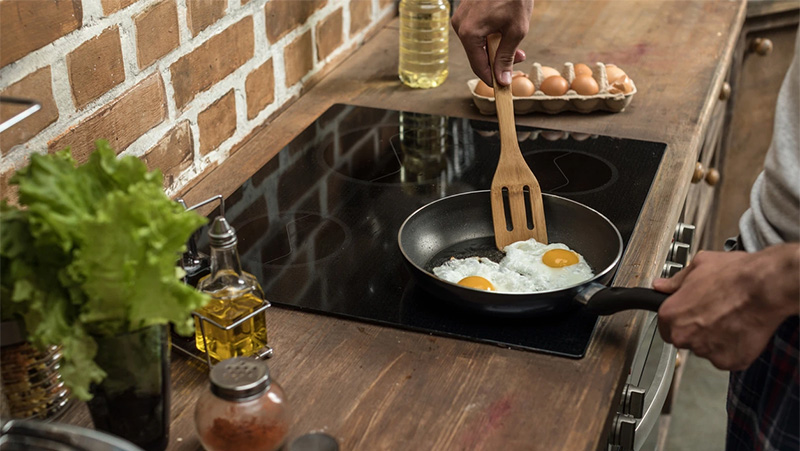Does Cast Iron Heat Slowly on Induction Cooktops?
Written By James Morgan
When it comes to cooking, particularly grilling, one of the most frequently asked questions is does cast iron heat slowly on induction? This query is especially prevalent among barbecue enthusiasts who are considering the shift from traditional gas or electric stoves to the modern efficiency of induction cooktops. The allure of induction cooking lies in its speed and precision, but how does it fare with the beloved cast iron pans that many of us cherish?
Understanding whether cast iron heats slowly on induction is crucial for anyone looking to maximize their cooking efficiency and achieve the perfect sear on a steak or the ideal crust on a homemade pizza. But first, let's delve into the mechanics of how induction cooking works and how it interacts with cast iron.

How Induction Cooktops Work
Induction cooking is a revolutionary cooking technology that uses electromagnetic fields to heat cookware directly. Unlike traditional stoves that heat the air around the cookware, induction cooktops create a magnetic field that directly induces heat in the pan itself. This results in faster cooking times and more precise temperature control. However, it requires cookware that is ferromagnetic, which means it must contain iron for the induction field to work effectively.
Cast iron, being rich in iron, is naturally compatible with induction cooktops. However, the question remains: does it heat slowly on induction compared to other materials? To answer this, we need to consider the properties of cast iron.
Properties of Cast Iron
Cast iron is renowned for its durability and excellent heat retention. It can hold onto heat for extended periods, which makes it perfect for cooking tasks that require consistent heat, such as searing meat or slow-cooking stews. However, this same property can make it slow to heat up initially compared to other materials like stainless steel or aluminum.
On an induction cooktop, the heating speed of cast iron is influenced by several factors, including the thickness of the pan and the power of the cooktop. Generally, thicker pans take longer to heat up, but once they do, they maintain their temperature exceptionally well.
Induction Efficiency with Cast Iron
Despite its slow start, cast iron ultimately benefits from the efficiency of induction cooking. The direct transfer of heat to the pan reduces energy loss and increases cooking efficiency. For barbecue enthusiasts, this means that once your cast iron is hot, it will stay hot, allowing for perfect grilling and searing.
For more insights on how cast iron retains heat on induction cooktops, you can visit Grilling4All's detailed blog post.
Practical Tips for Using Cast Iron on Induction
Preheating Techniques
To combat the slow heating issue, it's advisable to preheat your cast iron on a low setting before cranking up the heat. This gradual increase allows the pan to heat evenly and reduces the risk of hot spots.
For those who love making pizza on cast iron, check out this guide on achieving the perfect crust using induction cooktops.
Matching Pan Size with Induction Ring
Another critical factor is ensuring that the size of your cast iron pan matches the size of the induction ring. A mismatch can lead to uneven heating and longer cooking times. You can learn more about this in our detailed explanation on matching pan sizes.
Conclusion: Is Cast Iron Worth It?
In conclusion, while cast iron may initially heat slowly on an induction cooktop, the benefits far outweigh the minor inconvenience. Its superb heat retention makes it ideal for a variety of cooking tasks, especially for barbecue enthusiasts who value consistent and intense heat. With a few adjustments, such as preheating techniques and proper pan size matching, cast iron can be a formidable ally in your kitchen arsenal.
If you're considering switching to induction, you might want to read about the best induction cooktops for cast iron before making a purchase.
For further reading on how induction interacts with cast iron, you can visit this comprehensive guide by Tom's Guide.

FAQs
Does cast iron work well on induction cooktops?
Yes, cast iron works excellently on induction cooktops due to its ferromagnetic properties, making it compatible with the electromagnetic field generated by the induction element.
Why does cast iron take longer to heat on induction?
Cast iron's dense and thick nature means it takes longer to heat up initially. However, once heated, it retains heat very well, making it efficient for cooking.
Can I use a cast iron skillet for all types of cooking on induction?
Absolutely! Cast iron skillets are versatile and can be used for a wide range of cooking techniques, including searing, baking, and frying, especially when paired with the precise temperature control of induction cooktops.



